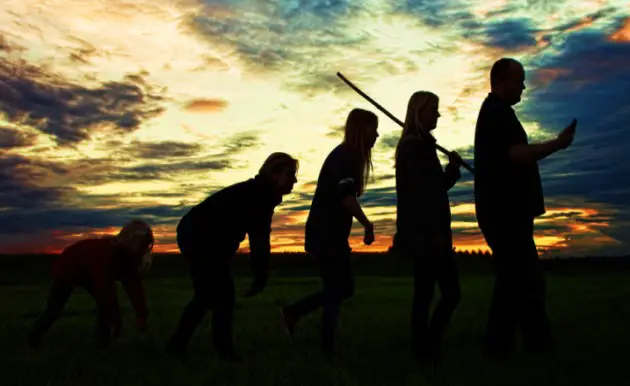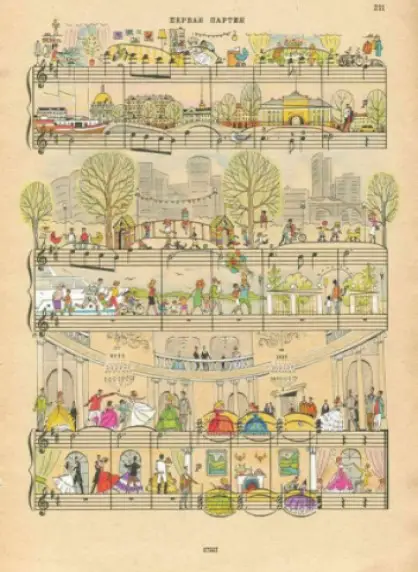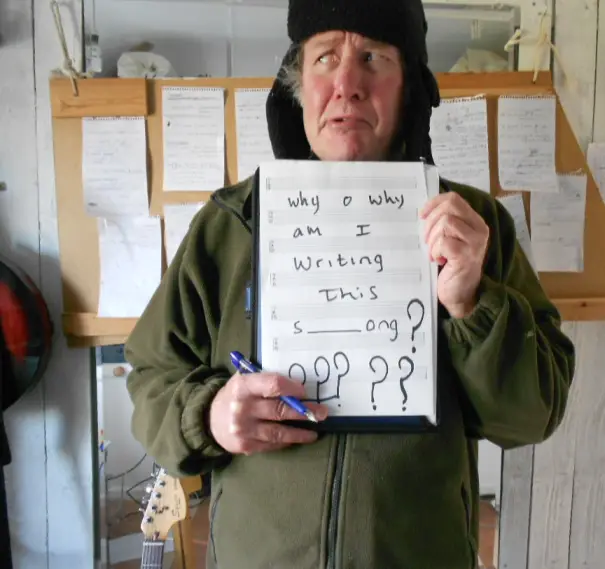Why do people write songs ?
 Image courtesy of Fotografia.Ges
Image courtesy of Fotografia.Ges
Writing a song is always a journey and that's often why people write them. They help us understand ourselves and our complex emotions. They help us figure out why we feel the way we do and share what we discover with others. There's also a broader social benefit as listeners adopt songs which are relevant to their own lives.
Writing a song is also great fun and is simply one of the most rewarding things a person can do.
I asked sixty songwriters what they love about writing songs. Their answers were surprising in some ways, but it was no surprise to see the role of emotions feature so highly.
-
Emotional High of Creation ........... 11.67 %
Freedom of Expression .................. 11.67 %
Emotion derived from Sound ........ 10.00 %
Emotional Journey in Writing .........10.00 %
Enjoy Creative Process .................10.00 %
Self Therapy .................................. 10.00 %
I Don't Enjoy Songwriting ............... 6.67 %
It's Like Solving a Puzzle ............... 6.67 %
Exploring What's Possible ............. 6.67 %
Songs Are Like Babies or Children.. 5.00 %
Performing them ............................ 3.33 %
Sharing Ideas ................................ 3.33 %
Monetary Gain ............................... 1.67 %
It's an Addiction ............................. 1.67 %
It's a Record of Past Emotions ...... 1.67 %
Songs certainly describe our emotional attachment to the world. But what pushes us from casual observer into songwriter varies considerably.
It may be through external inspiration; such as a party which sparks emotional connections. A chance meeting with a stranger who just happens to push all our buttons. A film, a book or a piece of art. Or it can happen in the opposite direction, a strong emotion inspiring us to create a story around that particular feeling.
Inspiration could also begin with a musical rhythm or a motif or a string of words or anything at all we suddenly notice or care about. Either way, a song always features emotion and a story, and the song becomes the portal or bridge between them.
Either way, songs are usually born out of the song writer's observations and experiences. They're inspired by hard knocks, broken dreams, chance encounters and holes in the ground. They wash up on beaches, appear out of no-where and even fall from the sky.
Any object, or any event that ever happened any were in the world could find itself the subject of a song. Especially when there's a lesson to be learned. All it takes is a little love and understanding to fashion it into an emotionally charged package which is easy to learn, moving and educational.
Once heard, a good song will be catchy and demand to be heard again, so we'll replay it over and over. And it's not only the tune which captures our imagination. The combination of words and music provides a factual context for the emotion it evokes. To a human mind, this makes perfect sense and our imagination uses it form an image of life and the outside world.
Song helps humans evolve
 Image courtesy of Johannes Plenio
Image courtesy of Johannes Plenio
It just so happens that whilst stimulating us aurally, song satisfies the human mind's thirst for understanding and secured longevity. Song provides a supercharged connection between events and emotion which helps our brains steer us through life. It may be hard to imagine that annoying little tune stuck upstairs is vital for survival.
But our mind's pretty sure it's preparing us for something. Rehearsing emotions, linking them with events over and over so that when the unexpected happens, it's not so unexpected and we have lots of super fast connections hard wired to help us react. It means we're able to think quickly, to escape or grab lunch, or grab an appropriate mating partner.
Our minds love a dramatic story with emotion
Let's say for example, you're going about your daily life when you realise you have a very strong feeling about, 'wet mushy leaves.' Now the first thing to notice is the very strong feelings. This is key to what the song package consists of. Currently accepted models suggest there are around eight core emotions. Fear. Anger. Joy. Sadness. Trust. Disgust. Anticipation. Surprise. Each has many sub categories, and connecting variations.
We tend to remember emotions because they have a physical effect upon us. We shake, we rattle and roll or feel warm and fuzzy inside. Emotions control our behaviour and lead us to destruction, reproduction, rejection and protection. They help us orient ourselves and explore the world. We like to feel nice emotions and will seek them out, anywhere we can get them.
They're a good indicator of well being and a welcome reward for behaving appropriately. Emotions are what give meaning to our lives. We can't live without them and we can't have a song without them. A song is the by far the best way to communicate emotion, in fact, to our minds, a song is what emotion sounds like. This is why we've evolved to use them for learning and loving and losing and living. There are links at the bottom of the article to where you can learn more about emotions.
The second thing to note about the mushy leaves is the context. The story of how the leaves got here, what colour they were, what really happened, etc ? This may be intriguing or confusing. It may make us seek clarity upon our mental state ( songs usually do ), 'why do I grieve for these wet mushy leaves, is it because they represent the death of summer ? Or why do they frighten me, or why do I want to touch them, why, why, why ?' And this curiosity is really important for understanding how songs are made and how the human mind works.
We can believe anything we like in a song
The mind may simply seek the facts about the leaves and conclude that, years ago, something bad or dangerous happened when leaves where on the ground. Or perhaps a grandparent told some yarn about a plague of wet mushy leaves which threatened to engulf humanity. There may even have been a book or a film.
It doesn't matter how real or imagined the story is, the mind will see it just same and instruct the limbic system to flood our bodies with the necessary chemicals for dealing with just such an event. To us, this might feel very uncomfortable or it might make us feel very loved and connected.
But without a story to go with the emotion, our mind is not happy and seeks to justify all the fuss. It will expend a considerable amount of resources doing this. It may, if so inclined, make up a long protracted fictional narrative about the leaves simply to stop itself going around in circles looking for an answer.
Song and story are tools for evolutionary wisdom
 Stories are so fundamental to our learning process, it makes good evolutionary sense for us to enjoy them. Some of us enjoy them to such an extent that we spend half our lives going around reliving events, thinking what we could have done differently or planning for future unknowns by envisioning multiple outcomes.
Stories are so fundamental to our learning process, it makes good evolutionary sense for us to enjoy them. Some of us enjoy them to such an extent that we spend half our lives going around reliving events, thinking what we could have done differently or planning for future unknowns by envisioning multiple outcomes.
It's sometimes suggested that the story part of a song can be regarded as just packaging. But setting and emotional effect are inseparable. Without believable context, the emotions and the lesson they have for us, don't quite add up. As far as our mind is concerned, that's not quite good enough. So all those questions over why we feel so strongly about wet leaves is our mind's attempt to justify the emotion.
It may fabricate a story which can be true or half true or total fantasy. The part of the brain which needs an answer, doesn't care. So long as it believes a story could conceivably be real. It treats all tales, tall and otherwise, with equal curiosity and feeds them to our limbic system.
The internal song writer
So what's the limbic system got to do with song ? Well, quite a bit. It's a primitive part of the brain where memories and emotions are handled. The amygdala is thought to be the key processing area for emotional and associative learning. It also regulates attention and memory.
In fact, several regions and processes are used in creating and replaying a song. It doesn't just happen in the left or right brain, it involves trial, error, filtering, and the forming of new connections in the brain as well as in the real world experience.
The External Songwriter
The person writing the song maybe motivated by any number of reasons but the song won't be written without a certain amount of curiosity. A song is a unique perspective and it's the search for sense and understanding which often torments a writer to get to the bottom of something.
Impressing friends is one thing, but getting to the emotional heart of a grinding humanitarian abomination is something altogether more compelling. And once in front of an audience of strangers, the song must appeal to the sensitivities of others and so must have some emotional authority.
Exposing your unique perspective to strangers is one of the most terrifying yet rewarding things you can do. If you've got it right, you find that most agree with you and we're moved by what you said. There is no more brutal a way of having your take on life validated by strangers, but in doing so you become part of their emotional lives.
Why song and no other form of remembering ?
The fact of the matter is that our memories aren't as good as we'd like them to be. But our emotional memories are longer lasting and fairly predictable. So our brains have evolved to associate emotions by replaying events repeatedly. Sound familiar ? Yes, that's what a song does. Replays a story over and over in a way we find convincing to remind us of emotions linked with those events.
This gives us a much better chance of doing the right thing for ourselves and the species. It helps us remember the blueness of the sky, the sound of the sky lark and the tallness of the grass and the possibility of poisonous snakes on just such a day.
This ability of ours to link emotion with events and places works to our advantage when it comes to song writing. We only need to visit a place where there are wet mushy leaves or tall grass and the entire experience is recorded and catalogued. The place or event will be recalled through words and the associated emotions will be be dramatised in the music.
Song's trump card
 Song is also great fun. It builds relationships and alters mood. It changes the way people think, act and feel. Young and old benefit greatly from the chance to make music in their community or alone. No other art form can alter our mood so quickly and no other art form encourages us to join in by singing or dancing. And here's where song trumps all other art forms.
Song is also great fun. It builds relationships and alters mood. It changes the way people think, act and feel. Young and old benefit greatly from the chance to make music in their community or alone. No other art form can alter our mood so quickly and no other art form encourages us to join in by singing or dancing. And here's where song trumps all other art forms.
Even when the story is difficult or sad, if the music has an uplifting lilt or attitude, it's cheerfulness will out-trump the sad message in the words. This always happens 100% of the time. A sad story often becomes a happy song and so an unpleasant event or experience is given a positive interpretation. The story may take a back seat in such instances but it's always there and through this unique quality, the song teaches us to cope with bad experiences.
But stories are just for kids,right ?
Not really. As already mentioned above, it turns out that our minds are totally addicted to stories. So much so that we can't live without them. Seriously ! Without being able to think abstractly and imagine a future, many of us would succumb to the knowledge and crushing futility of our limited existence.
For example, in western cultures, the bible is often referred to as 'The Greatest Story Ever Told.' Whether you believe that story or not is not the point. The point is that it remains a great source of comfort and inspiration to millions of people. It gives communities a sense of belonging and a combined history, real or not, that each individual can feel connected to.
The ritual of singing community songs predates modern religion and it's unique ability to bind communities and groups is well documented. Community song acts like a glue as may be witnessed at sporting events, playgrounds and churches.
People naturally see the world in stories
Here's another example. If you show people a very short film of two triangles, a circle and rectangle. You'd expect them to be able to describe it quite accurately wouldn't you ? Turns out only one in thirty four people can do this.
Instead, the other thirty three assigned personalities and gender to the shapes and fabricated stories involving, confrontation, fear and persecution. Believe it or not, this was a real experiment in a Massachusetts college in 1934 and shows that the brain that sees the world in stories. This is normal and the mind that doesn't is the exception.
If we go back a little further, say 30,000 years to the Chauvet region of France we find cave paintings depicting dramatic hunting scenes. What a story they tell, life and death and the history of the tribal family. And one can imagine their periodic unveiling being accompanied by a shouts and drums while noble elders sang in detail the trials of former citizens. What a fantastic way to engage the group. Allow them to feel the excitement and fear. To show the young what to aspire to. To demonstrate how to be a human or perhaps even how to be a 'good human.'
Psychologists believe that stories help us to plot and plan and form alliances. We learn strategies and are introduced to crazy ideas we might have to confront one day. We learn how back-stabbingly devious people can be without finding out the hard way. We also learn what it might be like to love and be loved.
We might also look upon victims with fresh eyes and discover a compassion in ourselves which we didn't know was there. We may also appreciate beauty for the first time because there is space for it. Most importantly, we learn how other members of the group react to such stimuli. There's a lot of evolutionary good stuff in a story. From this evidence, it appears that stories are essentially born out of our need to survive and thrive.
Song, story and love
 Image courtesy of Ilie Micut-Istrate
Image courtesy of Ilie Micut-Istrate
When it comes to procreation, the synergy between song and story really comes alive. More than half the songs ever written are about love and when we first meet a new potential mate, our brain goes into overdrive. It can't help but create fantasies about them.
It begins by trying to figure out more about them, most of which will be based on guess work gleaned from stories about similar people and past experience. It will then create scenarios and visualisations of first dates, first kisses, first other things, meeting the parents, where you'll live, how they'll make you a better person, how responsible you'll become, how happy, how many kids you'll have and probably half their names. And it will do all this before you've even found out the other person's name.
There'll be oodles of emotion, pots of chemistry and so our brain's need a story to help it along because emotions without story are not the full package. To the mind, the moral and the meaning are incomplete. So bereft of the full story, our mind just makes one up. You may well live half a lifetime with this person in your imagination. What's more you'll half believe it's true. This is called neuroplasticity but that is a whole other story.
Are dreams and songs related ?
Good question. Not only in our waking hours are we consumed by stories. Most of us are plagued by bizarre tales on a nightly basis. Many of us witness the most grotesque, terrifying events which leave us traumatized for hours. Even though they are dreams, we know they are connected to our real lives and we may need therapy to get over them.
So, what possible evolutionary value is their to keep dreaming about falling, or flying or being lied to or making clothing out of minced beef or having your teeth fall out ? Quite a lot, it turns out. And you get one guess as to which part of the brain is responsible for dreaming. Yip, limbic Joe and his buddies.
What's more, studies in rats have found that individuals who are deprived of dreaming sleep become stupid. They don't learn from their mistakes, as a result, they don't find as much food and they don't do as well as the other rats who are reliving, seemingly incoherent useless fantasies over and over.
So as with regular stories, dreams are born out of the race to be top rat. To compete with peers and ensure the next generation are the best of the bunch. It also ensures that the current pack are less likely to be lunch for some opportunistic predator because they were wandering around deprived of sleep. Proof indeed that individuals will thrive and survive better if they are rehearsing emotionally compelling scenarios, even if we don't quite know why.
Why we prefer a good mystery
Interpretation of dreams is often similar to the interpretation of song. In-so-much-as we can become bewitched by both without really understanding why. Some believe that it's the attempts to interpret that we find most alluring. It's certainly true that songs without words or those with ambiguous words offer more scope for bringing the listeners into the story.
This is important because it's very often the listener's story which completes the song. A point born out by he fact that listener 'A' can have a totally different emotional reaction than listener 'B' on hearing the same piece of music. This is possibly because our imagination is so keen to join the dots and fill in gaps.
So the the more intriguing the tale, the more likely we'll engage with it by filling in our own detail. Often to the point of missing out some of the facts presented and inserting our own. It may even be the case that this is what dreams are; the creation of a story to justify an emotion.
Songs come from being alive so that we can be alive longer
 So humans have lots of uses for song and it's development has many phases. Fundamentally, song comes from our sense of being alive and our will to thrive. It's born out of our deepest hopes, darkest secrets, and our most dreaded fears. Song is the external expression of what we are inside.
So humans have lots of uses for song and it's development has many phases. Fundamentally, song comes from our sense of being alive and our will to thrive. It's born out of our deepest hopes, darkest secrets, and our most dreaded fears. Song is the external expression of what we are inside.
It's born out of life, both where life is a mystery and where life is understood. It's re-aired because it's fun and to do so re-affirms that we exist, have shared values, and are wise to the secrets of wet mushy leaves, long grass and the hidden dangers therein. In short song is an exciting, elaborate evolutionary tool which just so happens to help us with our evolution.
A brief summary of why people write songs
Writing a song is super rewarding and great fun.
Song helps you get in touch with and understand your heartache.
Writing a song gives voice and structure to emotions, it's what emotions sound like.
Through song writing, you become an expert upon the related issues.
A song helps you to remember or forget, move-on or re-live.
Song is a great tool for individual or community spirit.
Song writing is vital for learning about the world we live in.
We write songs because we constantly need new ones to help us make sense of new challenges and experiences.
Songwriters are liked and respected because they illustrate humanity in a way which the listener may not have seen otherwise.
Other resources
You can Download a wheel of emotion here : https://imgur.com/tCWChf6
To learn more about how emotions affect behaviour, visit https://en.wikipedia.org/wiki/Robert_Plutchik
